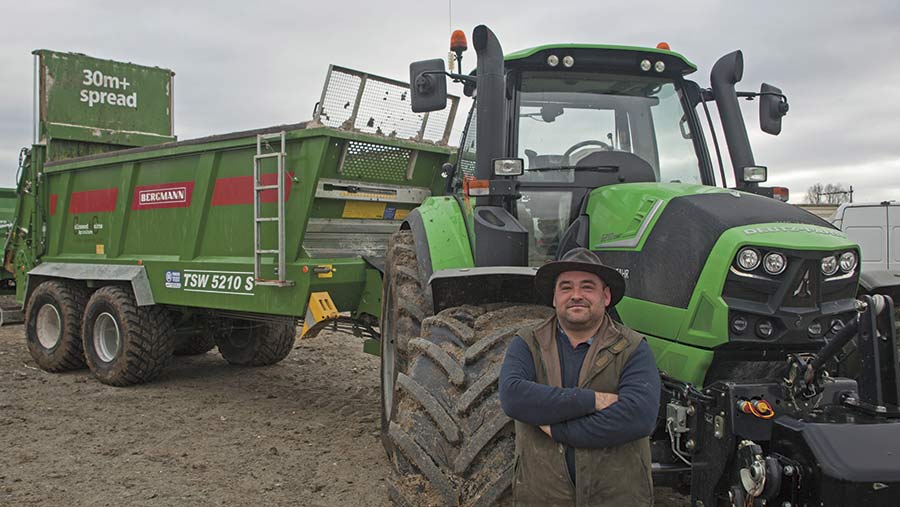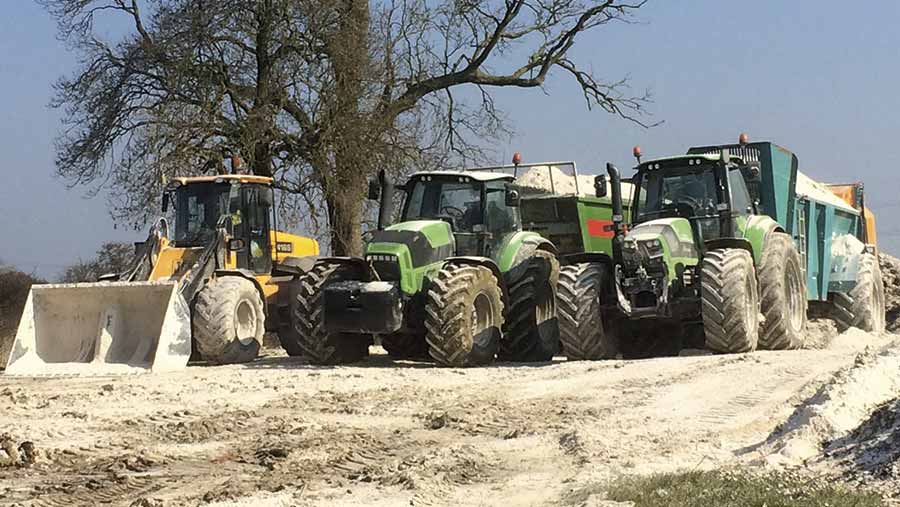Bucks contractor finds niche in cost-effective gypsum spreading
Just three years ago Andy Colinswood was working a full-time job driving a wagon for the family haulage firm and his farming enterprise played second fiddle.
Then in 2013, he happened to be in the right place at the right time to seize a business opportunity that has seen his contracting firm boom off the back of delivering and spreading gypsum.
Gypsum, or calcium sulphate dehydrate to give its scientific name, has proven soil conditioning properties and is a cheap source of sulphur – a nutrient that has been in decline in soils due to reduced industrial emissions.

While hauling the product to farms nationwide, he was often told there was a lack of cost-effective spreading services, with lime contractors typically charging about £4.50/t.
Seeing the potential to provide a cheaper option for farmers once the gypsum had been delivered, Mr Colinswood did his sums and reckoned he could offer a much cheaper application job.
See also: Farmer Focus: Benefits of applying calcium sulphate to land
Between the family haulage firm and his contracting business C&C Agriculture, they now provide the product – derived from recycled plasterboard – for free, with a small haulage cost depending on the distance from source. Spreading is carried out for £1.50/t.
The spreading enterprise now employs five full-time staff running three rigs and applied more than 70,000t of gypsum last year, from Essex all the way across to Andover in Hampshire.
“Most of our work is in Northamptonshire, Buckinghamshire and Bedfordshire and we usually drive directly to the job, but if we have a long way to travel, we put the machines on a low loader.
“It’s pulled by our 51-plate ERF ECX, which costs twice as much to repair as anything else because we can’t get the bits anymore. It’s done 1.9m km and it’s still got the original engine and gearbox,” says Mr Colinswood.
Tractor shopping
To get started back in 2013, he opted for a 150hp John Deere 6920 with a Bergmann TSW 5210 S spreader and has built the fleet from there.
He says the John Deere was a little underpowered for the size of spreader and had no airline for brakes, so has since been banished to the stock yard where it sits on the front of a Keenan diet feeder, slowly adding to the 12,500 hours already on its clock.

A good relationship with friend and Deutz-Fahr salesman David Griffin then saw a switch to a brighter green livery and he now has four Deutz tractors, with three pulling the spreaders.
The first of the trio to arrive was the 220hp L730, followed by two more in 2016, including a 210hp 6210 and a 180hp 6180 with a F260 6t loader out front.
“We did go to John Deere to get a quote, but it would have been an extra £20,000 over the Deutz for each equivalent machine.
“I think it is an underrated tractor brand. We have put our L730 against a 300hp Case and it ran rings around it,” he adds.
Spreader choices
With the spreaders required to spread gypsum during the busy summer months and muck through the winter, Mr Colinswood needed a versatile and robust machine and was advised to go for a German made Bergmann.
He opted for the high-output TSW 5210 S – a rear discharge machine with a spinning disc platform, enabling it to spread a range of materials accurately.
Like most German machines, Bergmann has a good reputation and he reckons the 5210 was worth the hefty price-tag.
“It is an awesome bit of kit – you’d almost be able to spread rubble without breaking the machine, whereas our other spreaders snap shear bolts all the time.”
The big Bergmann is complemented by two smaller and less expensive Rolland Rollforce 6118 spreaders from France.
“You can get two of them for half the price of the Bergmann, but the next one we buy – for the coming season – is going to be a Bergmann, as it’s been so good.
“We’ve opted for the lifting front axle on the new one though, as it allows you to keep some weight on the tractor. At the moment, it’s like pulling a dead weight when its full,” says Mr Colinswood.
Loading up
To keep the spreaders full, the business has also invested in a plethora of loaders and now has a total of six machines, with some proving more reliable than others.
Mr Colinswood bought a 2015 Deutz-Fahr Agrovector 37.7 from new and says it is the worst machine he has ever purchased.
“It has been nothing but trouble. It’s made by JLG and even though it has been broken the whole time we’ve had it; they blame it on us because of the dust created when loading the gypsum. They won’t stand by the machine in terms of warranty,” he adds.
The rest of the loaders have been less problematic and include a Manitou 845 Elite, three JCB 550-80 Wastemasters and a JCB 416S shovel. Having a spare machine will also be useful when four spreaders are up and running for the coming summer.
“We have just bought the third 550-80 Wastemaster for a backup loader, so we’ll be able to split the team of four into two gangs if necessary,” says Mr Colinswood.
One-stop shop
With an increasing focus on improving soils, Mr Colinswood has seen the demand for gypsum rocket. In response, he had to recruit a rep to deal with customers and managed to tempt Mr Griffin away from the Deutz dealership he was working for.
With gypsum derived from recycled plasterboard classed as a waste product, it falls under waste management regulations and like compost, farmers require a licence for applications over 1t/ha.
Mr Griffin now provides a one-stop shop for sales, application maps and organisation of all the relevant permit paperwork, making the process as simple as possible for the farmer.
The business is set to continue its growth and Mr Colinswood plans to make the switch back to John Deere tractors, having set his eyes on a nearly new 7260R through local dealer, Farol.
“They are brilliant with same-day parts and service and we need to ensure reliability going forward.
“We want to expand the contracting side of the business, such as baling, and I’m looking to increase livestock numbers. In the next few years I hope to be calving 600 cows and running up to 2,000 ewes,” adds Mr Colinswood.
How does gypsum improve soils?
- Contains useful levels of nutrients, particularly sulphur, calcium and magnesium.
- Enhances structure and tilth, particularly on heavier soil types, making it more friable and reducing energy needed for seed-bed cultivations.
- Increases permeability for improved drainage, aeration and moisture retention.
- Ups aggregate stability, thus reducing capping, slaking, run-off and soil erosion in unstable sandy and silty soils.
- Allows soils to dry out more quickly after rain or irrigation, so it can be worked earlier.
- Binds organic matter to soil.
- Enhances bacterial activity and discourages plant diseases related to poor soil aeration.
- Helps to improves potato quality characteristics such as skin finish and storability.
C&C Agriculture kit list
Tractors
- Deutz-Fahr L730, 5120P, 6210, 6180
- John Deere 6920, 6610
Spreaders
- 2x Rolland 6118
- Bergmann TSW 5210 S
Loaders/Shovels
- 2012 Manitou 845 Elite
- 2015 Deutz-Fahr Agrovector 37.7
- 3 x JCB 550-80 Wastemasters (2014-2016)
- 2008 JCB 416S
Excavators
- 2008 JCB JS 130
- 2008 JCB 8026 CTS
Other selected kit
- 2001 ERF ECX plus low loader
- 2016 John Deere 960 round baler
- 10ft 3508 mower
- Twose 6575 rake
- Dowdeswell bale wrapper
- 3 x Dowdeswell five-furrow ploughs

